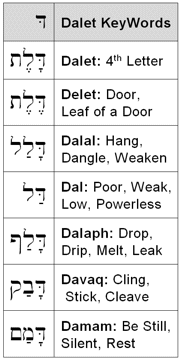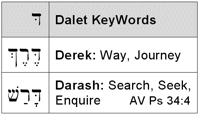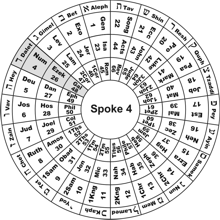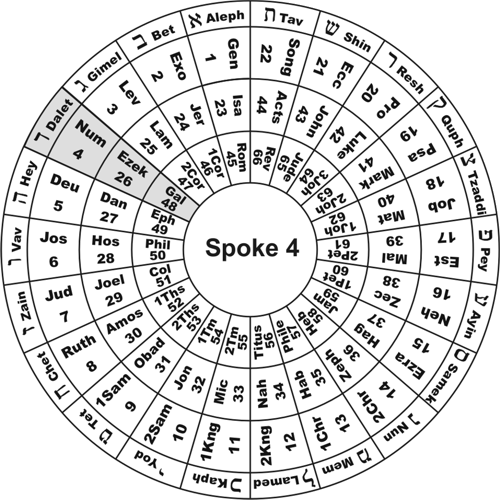The Door to the Way of God
And the temple and the sanctuary had two doors. And the doors had two
leaves apiece,
two turning leaves; two leaves for the one door, and two leaves
for the other door. And there were made on them,
on the doors of the temple, cherubims and palm trees, like as were made upon the walls; and there were thick planks
upon the face face of the porch without.
Ezekiel 41:23ff (Spoke 4, Cycle 2)

 The name of the Fourth Letter comes from delet, the Hebrew word for a door, specifically the swinging leaf of a door.
It contrasts with petach (BW book pg 305)
which denotes the opening of the doorway, the entrance itself.
Ezekiel's description of the temple above displays two of its senses; the highlighted
words – doors and leaves – are all translations of delet.
It is based on the verb dalal meaning to dangle, to hang down loosely,
to be pendulous, like a draping
tent door or a bucket on a rope. This verb also means to weaken or enfeeble and
is the root of the name Delilah who brought down Samson, the strongest man ever to live.
It is the root of the noun dal (poor, plural dallim). The
association of these words, especially in conjunction with the meaning of Gimel as the Abundant Giver
(BW book pg 152), gave rise to the rabbinic tradition concerning the alphabetic
sequence recorded in the Talmud (Shabbat 104a):
The name of the Fourth Letter comes from delet, the Hebrew word for a door, specifically the swinging leaf of a door.
It contrasts with petach (BW book pg 305)
which denotes the opening of the doorway, the entrance itself.
Ezekiel's description of the temple above displays two of its senses; the highlighted
words – doors and leaves – are all translations of delet.
It is based on the verb dalal meaning to dangle, to hang down loosely,
to be pendulous, like a draping
tent door or a bucket on a rope. This verb also means to weaken or enfeeble and
is the root of the name Delilah who brought down Samson, the strongest man ever to live.
It is the root of the noun dal (poor, plural dallim). The
association of these words, especially in conjunction with the meaning of Gimel as the Abundant Giver
(BW book pg 152), gave rise to the rabbinic tradition concerning the alphabetic
sequence recorded in the Talmud (Shabbat 104a):
Gimel Dalet means Gemol Dallim (be generous to the poor). Why is the foot of the Gimel pointed toward the Dalet?
Because so the feet of those who are bountiful should be ever ready to seek beneficiaries.
God vividly displayed the weakness and poverty of Dalet in two Alphabetic Verses:
- AV Ps 119:25 My soul cleaveth (davaq) unto the dust: quicken thou me according to thy word.
- AV Ps 119:28 My soul melteth (dalaph) for heaviness: strengthen thou me according unto thy word.
"Cleaving" to the dust means to be near death. It recalls
the original death sentence God proclaimed
to Adam, "dust thou art and unto dust thou shalt return" (Gen 3:19) which is further amplified in the metaphorical description
of the dead as those who "sleep in the dust" (Dan 12:2) or "dwell in the dust" (Isa 26:19). Thus the verse concludes,
"quicken (restore to life) thou me according to thy word." Likewise, the "melting"
(literally dripping) of the soul signifies a loss of all strength and so the prayer concludes, "strengthen thou me
according to thy word." Putting these ideas together, the Rabbis recognized Dalet as the
Letter of Humility, Selflessness, and Self-Denial. This is the essence of the Fourth Letter.
The House of God has but one entrance – the Door of Repentance.
All these ideas come together in Christ's message to the Church of Laodicea (Rev 3:17ff):
Because thou sayest, I am rich, and increased with goods, and have need of nothing; and
knowest not that thou art wretched, and miserable, and poor, and blind, and naked:
I counsel thee to buy of me gold tried in the fire, that thou mayest be rich; and white raiment, that
thou mayest be clothed, and that the shame of thy nakedness do not appear; and anoint thine eyes with eyesalve,
that thou mayest see. As many as I love, I rebuke and chasten: be zealous therefore, and repent.
Behold, I stand at the door, and knock: if any man hear my voice, and open the door,
I will come in to him, and will sup with him, and he with me.
God admits us into His House only when we have recognized our utter weakness, helplessness, and
complete dependence on Him. We must admit we have sinned, humbly repent, and turn to fully follow Him and Him
alone where ever He leads. This is the Way of God (Derek Elohim) taught by the Lord Jesus Christ (Mat 16:24ff):
Then said Jesus unto his disciples, If any man will come after me, let him deny himself,
and take up his cross, and follow me. For whosoever will save his life shall lose it: and whosoever will
lose his life for my sake shall find it. For what is a man profited, if he shall gain the whole world,
and lose his own soul? or what shall a man give in exchange for his soul?
The fourfold cross –  – is the
ultimate Biblical symbol of death and self-denial.
This is the Gospel message typologically taught in Numbers, the Fourth Book, which records how
God led the children of Israel forty years through the wilderness until the rebellion of their flesh was
quenched. It links directly to the KeyWord derek (way) that God used in the majority
of the Alphabetic Verses corresponding to Dalet: – is the
ultimate Biblical symbol of death and self-denial.
This is the Gospel message typologically taught in Numbers, the Fourth Book, which records how
God led the children of Israel forty years through the wilderness until the rebellion of their flesh was
quenched. It links directly to the KeyWord derek (way) that God used in the majority
of the Alphabetic Verses corresponding to Dalet:
- Shew me thy ways, O LORD; teach me thy paths. AV Ps 25:4
- I have declared my ways, and thou heardest me: teach me thy statutes. AV Ps 119:26
- He hath turned aside my ways ... he hath made me desolate. AV Lam 3:11
- Make me to understand the way of thy precepts: ... AV Ps 119:27
- Remove from me the way of lying: and grant me thy law graciously. AV Ps 119:29
- I have chosen the way of truth: thy judgments have I laid before me. AV Ps 119:30
- I will run the way of thy commandments, when thou shalt enlarge my heart. AV Ps 119:32
- The ways of Zion do mourn, because none come to the solemn feasts: ... AV Lam 1:4

If only the children of Israel had truly prayed that prayer of Dalet, "Teach me thy ways, O Lord!"
But that is not what happened. They rebelled and refused to follow the Lord into the Promised Land and so He commanded
them to turn and go "into the wilderness by the way (derek) of the Red Sea" to wander forty
years until all the rebels were consumed (Num 14:25). Had they obeyed they would have immediately entered into the abundant life
of the Promised Land rather than wandering for four decades. Their experience in the wilderness prefigures
the Christian pilgrimage through the desert of this world (Mat 7:13ff):
Enter ye in at the strait gate: for wide is the gate, and broad is the way,
that leadeth to destruction,
and many there be which go in thereat: Because strait is the gate, and narrow is the way,
which leadeth unto life, and few there be that find it.
These symbols find their ultimate meaning in the Lord Jesus Christ who is revealed as both the Door (Delet)
and the Way (Derek) in the Fourth Gospel (John 10:9, 14:6).
|



